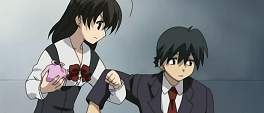



I'm sure like many others I was enthralled by the story that the final episode of School Days had been indefinitely postponed due to a supposedly violent ending and its likeness to a real-world killing. Not one to pass up on controversy, I queued up the series expecting it to be a fluffy, real-world version of Shuffle! or perhaps akin to Kimi ga Nozomu Eien; what I didn't expect was an unflinching, overly-dramatic portrayal of the depths of teenage decrepitude.
the series' H-game roots are only evident in the amount of sexual deviance present
The first episode of this petite twelve episode series is as mediocre and clichéd as I expected: introverted loner Makoto takes a liking to a girl he sees on the train, female best friend tries to help him get together with her while secretly having the warm-and-fuzzies for him herself. Rolling my eyes and switching off my sensibilities I began to place bets on the most promising axe-wielding female: perhaps the fun-size, silent one is actually a dark-horse in all of this. It took less than half the series to convince me that ending with violence is just one of the punches that School Days will deliver.
Read the rest of this entry




It's hard to describe Lucky Star without using words such as "meta" or "proto", or comparing it to similar all-female high-school comedies such as Azumanga Daioh or School Rumble or perhaps drifting into expletives about the circular Suzumiya Haruhi references by Kyoto Animation. The concept to take away from Lucky Star is that it is relevant to compare it to all of these things, and brutally unfair.
some of the late-to-the-party characters seem ignored compared to the tried and tested Kagami x Konata tiffs
Lucky Star shines because it manages to not so much parody but lampoon modern otaku and anime by, paradoxically, being a fan pandering anime itself. The first episode was divisive in that many wrote off the long soliloquies as boring or blatantly obvious as to their purpose, this weaned off the Haruhi refugees like a brick wall. In retrospect the meandering script changed little in delivery or tone from the last episode to the first episode, unlike the aesthetics which, while universally well animated, showed how much the animators settled in to drawing the characters. The first episode did brilliantly in laying down the foundation of the rest of the series, characters were expanded upon and new ones introduced, but the humour and pacing remained.
Read the rest of this entry







